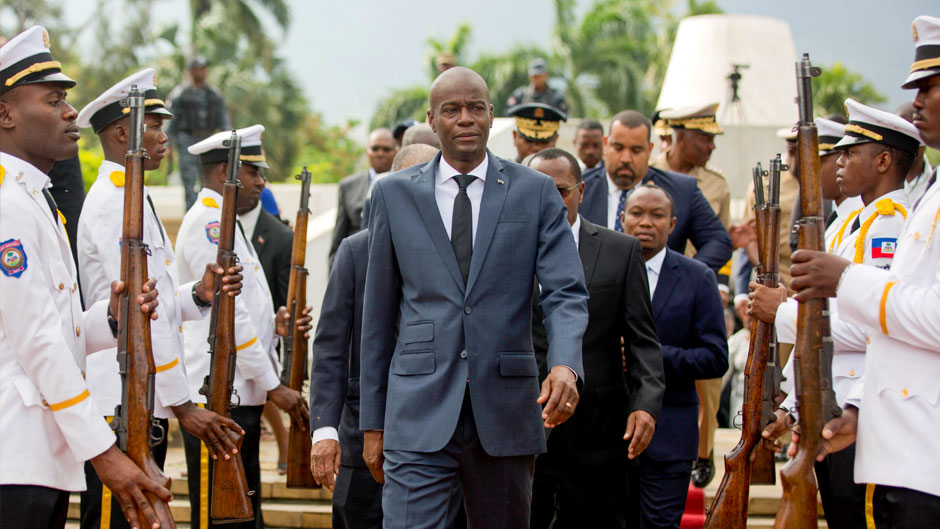News of the assassination of Haitian President Jovenel Moïse reached MarieGuerda Nicolas before dawn on Wednesday. She immediately started calling relatives and friends on the island to make sure they were safe.
“People are in shock,” said Nicolas, a professor of psychology in the School of Education and Human Development, who was born in Haiti. “Gunshots have been heard in the capital.”
Claude Joseph, Haiti’s interim prime minister, reported that Moïse had been assassinated in his own residence and that his wife was wounded by a group of people who broke into the home. The Miami Herald reported that some of the assassins spoke in Spanish, while others identified themselves as members of the U.S. Drug Enforcement Administration. However, Ned Price, spokesman for the U.S. State Department, told reporters that those claims were “absolutely false.”
Moïse, who came to power after a disputed election in 2017, had been ruling by decree since 2020. Thousands of Haitians had been protesting and calling for him to step down, citing corruption and accusing him of colluding with gangs in order to maintain power.
“We had a president who ruled by decree and now we do not have a president,” said Nicolas. “It does not matter what one’s political views are. This kind of action unsettles the mind of people of all ages.”
“It's a horrific crime,” White House press secretary Jen Psaki said during media interviews. The Biden administration was still gathering information, she noted. "We stand ready and stand by them (the people of Haiti) to provide any assistance that's needed," she added.
In a statement released by President Biden, he stated that he was “shocked and saddened by the assassination of President Moïse and the shooting of the leader’s wife, Martine Moïse.”
Louis Herns Marcelin, professor of anthropology in the College of Arts and Sciences who was born in Haiti, said that the assassination is the culmination of the intense violence that the country has experienced in the past year.
“I am surprised to see how easy it was for whomever was part of this commando raid to penetrate the residence of the president of Haiti with no resistance whatsoever,” he said.
The brazen attack calls into question the institutional mechanisms for protection in the country, said Marcelin. Both Marcelin and Nicolas said that they believe the Haitian police force has been weakened in part by the empowerment of local gangs that have engaged in open turf wars in the capital.
“I am also not surprised [at the assassination] because Haiti has endured great violence in the last three years and particularly in the past few months,” said Marcelin. “You have a situation in which politicians use criminality in order for them to realize their own objectives,” he added.
Many sectors in Haitian society have been complicit in power and influence of gangs in Haiti—businesspeople, politicians, those in private sectors. All have gangs for personal gain, protection, and in order and to “destabilize law and order,” according to Marcelin, who runs the Interuniversity Institute for Research and Development (INURED), a transdisciplinary research institute with the mission to contribute to the development of high-level research and scientific training in Haiti and the Caribbean. He also cited the erosion of institutions such as parliament and the national police by Moïse’s administration as circumstances that further destabilized the country while fostering insecurity.
Joseph has called for Haiti to be in a “state of siege” following the assassination, which imposes the closing of all borders and martial law.
But Nicolas stated that to establish order on the island, a provisional government will have to be established. That government must build up the police force and make sure that elections can be held safely, she pointed out.
Marcelin said that he does not believe the current Haitian government has the credibility to continue to rule. He also said that the U.S. and the United Nations cannot build a new government, since they have backed the Moïse government, which many Haitian residents believed had no legitimacy because of corruption and disputes regarding the official end of Moïse’s term—which many believed would have been in February. Despite weeks of strong protests across the country, Moïse defiantly remained in office.
“The U.S. has been totally indifferent to what is happening in Haiti,” said Marcelin. “They reduced their intervention to political feel-good statements about Haiti’s need to hold elections, when everybody knows that there are no conditions for an election.”
The best hope for the future is “international support to help promote a dialogue among Haitians in order for them to determine their own political future,” he said.

